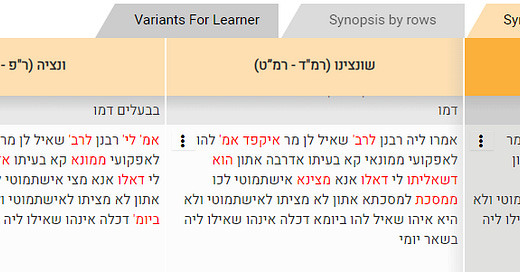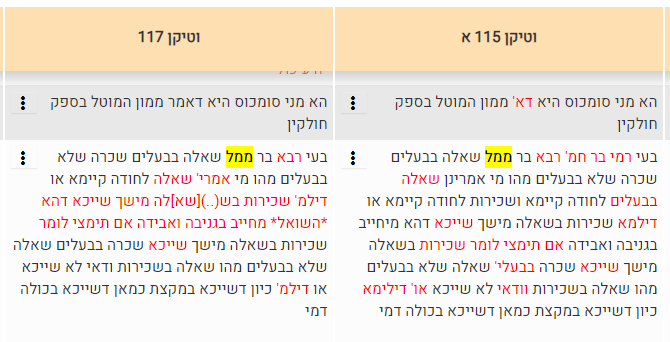Rava / Rav Ashi / Rabbi Abba Contractions
(1) In Bava Metzia 97a, consider this juxtaposition:
אָמַר רָבָא: מַקְרֵי דַרְדְּקֵי, שַׁתָּלָא, טַבָּחָא, וְאוּמָּנָא, סַפַּר מָתָא – כּוּלְּהוֹן בְּעִידָּן עֲבִידְתַּיְיהוּ כִּשְׁאֵילָה בִּבְעָלִים דָּמוּ.
Rava says: A teacher of children, the local gardener, the local butcher, and the local bloodletter, and a scribe of the city, with regard to all of them, if someone borrows an item from them at the time of their work, he is exempt from liability, as the case is comparable to borrowing an item and borrowing or hiring its owner with it. These people are always considered in the employ of the residents of the place where they work.
אֲמַרוּ לֵיהּ רַבָּנַן לְרָבָא: שְׁאִיל לַן מָר. אִקְּפִיד. אֲמַר לְהוּ: לְאַפְקוֹעֵי מָמוֹנַאי קָא בָעֵיתוּ?! אַדְּרַבָּה, אַתּוּן שְׁאִילְתּוּן לִי. דְּאִילּוּ אֲנָא מָצֵי אִישְׁתְּמוֹטֵי לְכוּ מִמַּסֶּכְתָּא לְמַסֶּכְתָּא, אַתּוּן לָא מָצֵיתוּ לְאִישְׁתְּמוֹטֵי.
The Gemara relates: The Rabbis said to Rava: Master, you are lent to us to teach us Torah, and so if we borrow an item from you, we should be exempt from liability. These Rabbis stated this based on Rava’s own ruling. Rava was angered by this and said to them: Do you want to take my money away from me? On the contrary, I am not lent to you; rather, you are lent to me, since you assist me in consolidating my Torah knowledge. And this is the proof that it is you who are assisting me: Whereas I am able to deflect you from one tractate to another tractate because I am not obligated to teach specifically that which you want to learn, you are not able to deflect me from what I wish to teach.
Rava stated who is in whose service (perhaps as a municipal employee), including a teacher of small children. The Rabbis of his academy turned around and suggested that Rava was then their employee (even though they weren’t small children). Rava took offense, and also showed them how they were wrong.
This might tell us something about contemporary Rabbanan as they relate to Rava — that they isn’t colleagues who happen to be in Pumpedita or Mechiza in his academy, but rather students who are subservient (kafuf) to him.
However, we also should make sure that we really have Rava here. It is compelling to have the Sages in Rava’s academy react to Rava’s own statement. Yet, while Rava made the initial statement, manuscript evidence is mixed as to whether the Rabbis spoke to Rava or Rav Ashi.
Thus, among printings, it is Rava in Vilna, and the shortened Rav’ in Soncino and Venice. It stands to reason that it would be shorthand for Rava, not Rabba.
In manuscripts, Cormona has Rav Ashi
as does Vatican 117
while others have Rava. Note that going two statements back in the gemara, both Rava and Rav Ashi are present.
How can this vary? Note that רבא ends with an aleph, which can be interpreted as the beginning of אשי. Note that the immediately following word is שאיל which has a shin, aleph, and yud. An erroneous deletion or duplication can then transform Rava → Rav Ashi or Rav Ashi → Rava.
(2) On 97b-98a:
הֵיכִי דָּמֵי עֵסֶק שְׁבוּעָה? כִּדְרָבָא,
The Gemara asks: What are the circumstances of a matter of an oath? The Gemara explains: This in accordance with the statement of Rava,
דְּאָמַר רָבָא: ״מָנֶה לִי בְּיָדְךָ״, וְהַלָּה אוֹמֵר: אֵין לְךָ בְּיָדִי אֶלָּא חֲמִשִּׁים, וְהַשְּׁאָר אֵינִי יוֹדֵעַ. מִתּוֹךְ שֶׁאֵינוֹ יָכוֹל לִישָּׁבַע – מְשַׁלֵּם.
as Rava says: One who approaches another and says: I have one hundred dinars in your possession, and the other says: You have in my possession only fifty dinars that I am sure about, and as for the rest, I do not know. As one who admitted to part of a claim, he is liable, by Torah law, to take an oath that he does not owe the other fifty dinars. Since he cannot take an oath to that effect, as he is unsure if he owes it, he must pay.
See Tosafot who quote Rabbenu Chananel, that this Rava quote from elsewhere doesn’t exist!
דאמר רבא מנה לי בידך כו' - פי' ר"ח דדברי רבא בהאי לישנא לא מצינו עיקרה בגמ' ומיהו קבלנו מרבותינו דעיקרה בפרק כל הנשבעין (שבועות דף מז.) דאמר רבא כוותיה דרבי אבא מסתברא מתוך שאינו יכול לישבע משלם:
Rather, if you look at Shevuot 47a, Rava endorses Rabba Abba saying this, by noting that his position is logical. That is enough to attribute it to Rava.
I’d proffer another suggestion. Having looked through lots and lots of manuscripts, I’ve seen that it is quite common for רבי אבא to turn to רבא or sometimes ראבא with an aleph, perhaps from ר’אבא, and ראבא is a common spelling of Rava. Or perhaps the transformation happens in the other direction on occasion.
Indeed, a bit later on 98b, we have Rabbi Abba bar Mamal.
בָּעֵי רַבִּי אַבָּא בַּר מֶמֶל: שְׁאָלָהּ בִּבְעָלִים, שְׂכָרָהּ שֶׁלֹּא בִּבְעָלִים, מַהוּ?
§ Rabbi Abba bar Memel raises a dilemma: If one borrowed a cow together with borrowing the services of its owner, and then, before returning the cow, he rented the cow from the owner without borrowing the services of its owner, what is the halakha?
and in two manuscripts, this is written as רבא בר ממל:
If so, the alternative to Tosafot is that כדאמר רבא should be כדאמר רבי אבא, in which case it’s an accurate attribution.







